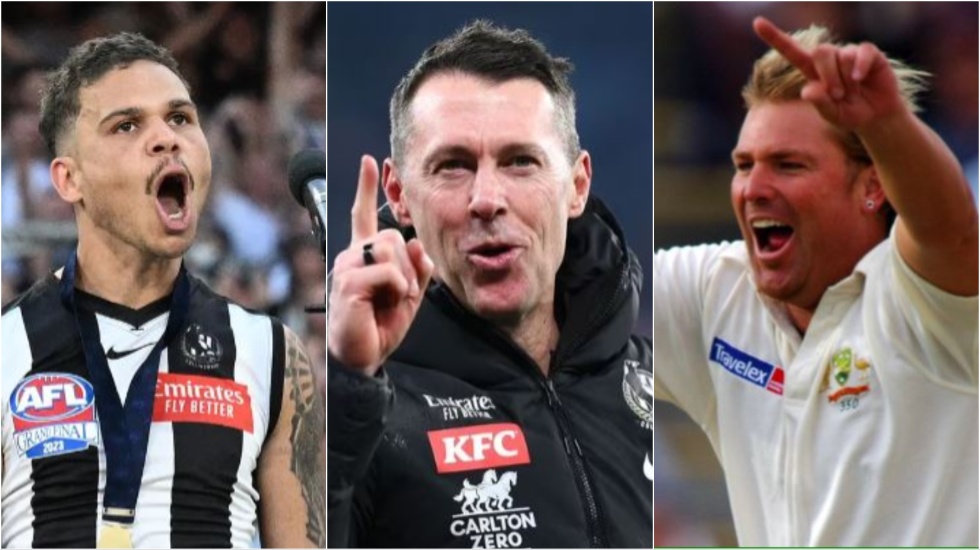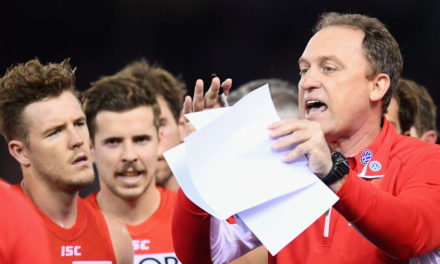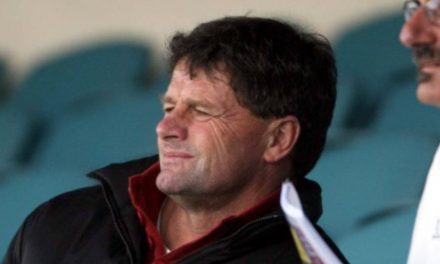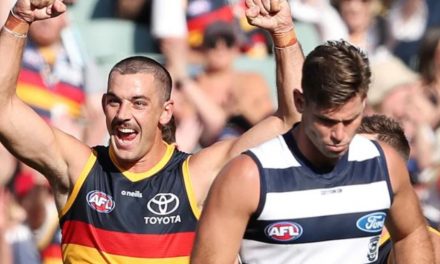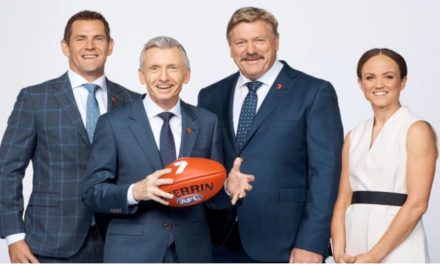From left: Collingwood’s Norm Smith medallist Bobby Hill, Magpie coach Craig McRae, cricket legend Shane Warne.
We need sport in the same way that we need art, we need hope. Just as the slow unfurling of spring follows the grey montage of winters before, there is reassurance in the draping of sun again, of growth once more. Of the beginnings of play.
Today we seem to be in a great heavy swathe of impulsivity. Never before has privacy and momentary thought been given such a platform to share and proliferate beyond the bounds of home. The globalised world seeps into our technological veins and floods us with a deluge of unknowns, terrors, obscurities, confusion and disappointments. Often, when the world burgeons with worries and perils, I am reminded to seek out the best in what we already have, removed from what we have created, to be what we are.
One thing that many philosophers have battled with for the greatest length of time is the weight of internal debate and rumination. It’s also one of the biggest dilemmas facing athletes today. The cacophony of external noise and opinion has not only grown louder, but follows players into their homes, their bedrooms, their beds if they let it. The technology creep, if we are not careful, can replace that real need for play and human touch.
This year, Craig McRae, Collingwood coach, instead of leading his team across the river, through the rapids, proving their willpower and strength, encouraged everyone to go with the flow. To read the river’s course. Check the surrounds. Build their capability in the conditions granted to them. Look to each other for support and reinforcement. Instead of fighting to go another way, his attitude was to lean into the enjoyment of it, ride the momentum.
With some ideas not too far placed from Ash Barty’s mindset coach, Ben Crowe, there was a greater focus on creating meaning and fulfilment in oneself, turning down the noise of external distractions. The noise that focuses on striving for what is often thought of as the next progression – money, status, social acceptance, broad recognition. In both cases, the idea is on inner work, rather than external validation. Crowe, in an interview with Leigh Sales, talks about the ways that we are the authors of our own lives. “We are the stories that we tell ourselves, about ourselves,” he says.
A big part of this methodology, and McRae’s it seems, is about getting comfortable with who you are and what you want. Getting comfortable enjoying that, regardless of the background interference.
Plato wrote that you can learn more about a person in an hour of play, than in a year of conversation. An idea that while at play, in a state of flow, when people are relaxed, you can reach out and touch the closest authentic part of them.
As children, the possibilities in play run the breadth and length of imagination. I watch my nephew, free from the burdens of life’s more heavy reflections, not jolted back by hesitation. He’s flying down the hill on his bike, smile broad, fears none. I identify it in a friend, radiant with a new flush of love. Emptied of worries she had before, this new form of play shakes her of her routine of self-reflection. I feel it as I talk to my friend on the phone, he’s a glass of red wine deep and finding the strands of an old story, funny still, funnier to share it with someone fresh. He’s back in that moment, on the cricket pitch, in full play. I hear it as a man shares a strand of his story on radio, letting the sound hold his vulnerability. They are at once hidden but fully in view, with only the ear to shape the shadows and the light. I taste it and hold out a hand to the fragrance of it, feet treading soil, fingers caressing cold water and outstretched leaves, chest rising for the scent of spring renewal in the air. It’s all in the play that takes you there.
PLEASE HELP US CONTINUE TO THRIVE BY BECOMING AN OFFICIAL FOOTYOLOGY PATRON. JUST CLICK THIS LINK.
Someone that comes to mind who had a good pull on this way of thinking was Shane Warne. Not only someone who worked hard, but played hard and maintained a sense of fun, a sense of humour. Warne balanced the serious with the not serious – which is a great deal of what sport is. It is striving and practising, imagining and leaping out of oneself. It’s physical and that moves the mind. It’s touch and connection. It’s camaraderie, knowing someone in different ways than is often limited in other parts of life.
Warne’s flipper was born out of play and creativity, experimentation being a leading force.
US-born Mason Cox, once not knowing what AFL was, transferred his basketball skills, learning to craft something new. McRae, who was one of Cox’s first AFL development coaches, saw that he could bring some of the play inherent in professional college basketball in the States and enjoy flashes of it in the Aussie rules game. Even after two detached retinas and the possibility of losing sight, Cox rebounded and returned to play. The only player to don wraparound glasses, being himself, and when you know the backstory, bravery for getting back out there after such a life altering injury, speaks volumes about what it means to feel part of something and want to stay part of it.
Bobby Hill, The Dazzler, you can see, come grand final day, as he sent the ball artfully fluttering through for another goal, he’s got play in him, he is playful. Taking risks, practising what he likes best, feeling into the moment, knowing what it’s like to be given chances and opportunities. He was flying. He had belief.
That belief can withdraw sometimes in life, but people and change can rustle it up within us, even if only momentarily.
In the thick of play, you see teammates tested and challenged and, in that way, there is a formation of understanding of who they are, what their values are. What it is that pushes them and holds them back. There is opportunity for kindness, for empathy, as they become exposed by their physical capabilities and life experiences. Blooming from that, is a sense of belonging.
Alongside captain Darcy Moore, McRae spoke of the 19th man in the finals – the fans. Bringing the support team into the fold and reinforcing the merits of their backing created that positive momentum. They were having fun and placing an arm around anyone else who was up for the ride.
Collingwood was playing this year, right up until the last 10 seconds. It could have been theirs, and in equal measure, it could not have been. Naturally, there was a degree of luck, of timing, as is with anything in life. Yet, there was something there, something akin to that of the Western Bulldogs in the 2016 grand final win. A bit of alchemy, a generous dose of hard work, tenacity – and belief.
In an interview on Fox Footy Darcy Moore said, “Part of that is having fun. Footy should be fun.”
If we’re having fun, it is in ways easier to move towards meaning and purpose. Just like a friend who said that he realised he was better, he could think better, when he was calm. Losing and making mistakes is all part of the itinerary of life, but fun helps to keep the perspective and move the momentum onwards and upwards.
Collingwood gathered up the fun, the gratitude, the composure under pressure, the enjoyment of play. And McRae was right on the sideline beside them. With all the differences between them, they were all accepted for who they were.
I am reminded of my own Dad’s gentle words ahead of anything big. “Be yourself.”
It won’t connect with some, but it’s real. And for those that do loop an arm of understanding through yours, like the team in black-and-white this year, the love and fun is strong. It is enough.

